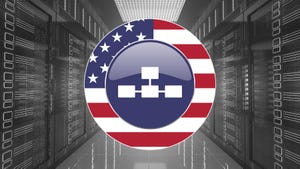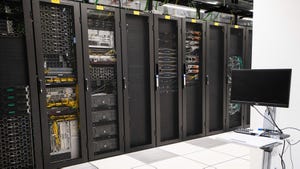Microsoft Deal Would Reopen Three Mile Island Nuclear Plant To Power AIMicrosoft Deal Would Reopen Three Mile Island Nuclear Plant To Power AI
The Three Mile Island Nuclear plant would restart under a deal in which Microsoft purchases its power to help fuel the tech giant's data centers.
September 20, 2024

Pennsylvania’s dormant Three Mile Island nuclear plant would be brought back to life to feed the voracious energy needs of Microsoft under an unprecedented deal announced Friday in which the tech giant would buy 100 percent of its power for 20 years.
The restart of Three Mile Island, the site of the worst nuclear accident in U.S. history, would mark a bold advance in the tech industry’s quest to find enough electric power to support its boom in artificial intelligence. The plant, which Pennsylvanians thought had closed for good in 2019 amid financial strain, would come back online by 2028 under the agreement, according to plant owner Constellation Energy.
If approved by regulators, Three Mile Island would provide Microsoft with the energy equivalent it takes to power 800,000 homes, or 835 megawatts. Never before has a U.S. nuclear plant come back into service after being decommissioned, and never before has all of a single commercial nuclear power plant’s output been allocated to a single customer.
But the economics of both the power and computing industries are changing rapidly. Tech companies are scouring the nation for power that is both reliable and helps them meet their pledge to fuel AI development with zero emissions electricity - driving a nuclear power revival.
“The energy industry cannot be the reason China or Russia beats us in AI,” said Joseph Dominguez, chief executive of Constellation. “This plant never should have been allowed to shut down, ... It will produce as much clean energy as all of the renewables [wind and solar] built in Pennsylvania over the last 30 years.”
The four-year restart plan would cost Constellation about $1.6 billion, he said, and is dependent on federal subsidies in the form of tax breaks earmarked for nuclear power in the 2022 Inflation Recovery Act.
Constellation will also need to clear steep regulatory hurdles, including intensive safety inspections from the federal Nuclear Regulatory Commission, which has never before authorized the reopening of a plant. The deal also raises thorny questions about the federal tax breaks, as the energy from the plant would all be produced for a single private company rather than a utility serving entire communities.
A partial reactor meltdown at Three Mile Island in 1979 sent the nation into a panic and the nuclear industry reeling. The unit that Constellation plans to fire back up sits adjacent to the one that malfunctioned 45 years ago.
Constellation and Microsoft conceived the novel deal to solve a deepening energy problem. The sprawling data centers Microsoft and other digital giants need have become so big and energy-intensive that they are straining existing power supplies across the nation.
Constellation disclosed months ago that it was exploring options for restarting Three Mile Island, which sits along the Susquehanna River. The news was met with mixed reactions. Nuclear safety advocates expressed alarm. But some community leaders welcomed the development, seeing potential to revive an economic anchor in a region beset with financial hardship. A study funded by the Pennsylvania Building & Construction Trades Council says a reopening would create 3,400 jobs at the plant and in businesses serving it and its workers, and generate $3 billion in state and federal taxes.
The tax breaks in the Inflation Reduction Act are crucial to making the deal economically feasible, according to Constellation. They provide a credit for every megawatt hour of nuclear energy produced.
Constellation declined to provide details about its contract with Microsoft or disclose the value of tax credits. Energy Secretary Jennifer Granholm has said in the past that federal subsidies could cut the cost of bringing a new plant on line by as much as half.
The announcement of the Microsoft deal follows an agreement Amazon reached with Talen Energy to purchase power produced by the financially troubled Susquehanna nuclear plant for a planned data center campus in Pennsylvania. That arrangement is running into snags with regulators, as regional utilities express concern that their ratepayers will be saddled with the bill for the power grid updates needed.
Amazon’s plan also raised concerns among clean-energy advocates that tech companies are shifting from driving the transition to clean energy to elbowing others out of it by claiming such large amounts of available clean electricity for themselves.
Dominguez argues that the Three Mile Island case is an example of how Silicon Valley’s outside-the-box thinking will help stabilize the power grid for everyone. The power from the plant will not go directly to Microsoft facilities but into the overtaxed regional power grid that serves 65 million people across 13 states and the District of Columbia, called the PJM Interconnection.
Nuclear power is considered “clean” because unlike burning natural gas or coal to produce electricity, it does not create greenhouse gas emissions. The plants are expensive to build or restart, and industry still has no long-term solution for spent but highly radioactive uranium fuel rods.
“This agreement is a major milestone in Microsoft’s efforts to help decarbonize the grid in support of our commitment to become carbon negative,” said a statement from Bobby Hollis, vice president of energy at Microsoft.
Dominguez said other ratepayers on the PJM grid will not be expected to shoulder any of the costs, nor will Constellation be seeking special subsidies from the state of Pennsylvania.
Constellation has already been doing extensive testing at Three Mile Island. It says most of its components are ready to operate again. “The plant is in extraordinary shape,” Dominguez said.
Three Mile Island is not the only nuclear plant the industry is eager to revive. The owners of a plant in Western Michigan called Palisades are also working to bring that dormant facility back. That project was approved for a $1.5 billion federal loan guarantee. The plant owner, Holtec, says it hopes to feed nuclear energy from Palisades into the region’s power grid by late next year.
The Palisades effort came about at the urging of Michigan Gov. Gretchen Whitmer (D), as her state struggles to both meet its climate goals and generate adequate energy. The plant was destined for permanent closure when Holtec acquired it in 2022. The company had planned to decommission the facility but changed course after conversations with the governor.
On Wednesday, though, that plan was dealt a setback when federal nuclear regulators disclosed “a large number of steam generator tubes” could be faulty and need further inspection. Holtec said the finding does not alter its plans. But some nuclear safety advocates argue the company’s push to quickly reopen the plant puts the public at risk.
The huge cost and regulatory headaches associated with nuclear power are not deterring the tech industry from betting on it. In a remarkable turn of fortune for an industry that just a few years ago was struggling to stay competitive and focused mostly on closing plants, it now finds itself in expansion mode. Beyond seeking contracts for power from existing plants, tech companies are also bullish on next generation nuclear technologies.
Several are investigating the potential of locating their facilities near small modular nuclear reactors that could feed them power directly. Such technology is in its infancy and has not yet been approved by regulators. That isn’t stopping a company chaired by Microsoft co-founder Bill Gates from doubling down on it. The firm, called Terra Power, this year began construction at what it plans to be a small reactor site in site in Wyoming.
Microsoft is also pursuing power from nuclear fusion, a potentially abundant, cheap and clean form of electricity that scientists have been trying to develop for decades - and most say is still a decade or more away from generating electricity. Microsoft has signed a contract to purchase fusion energy from a start-up that claims it can deliver it by 2028.
About the Author
You May Also Like









